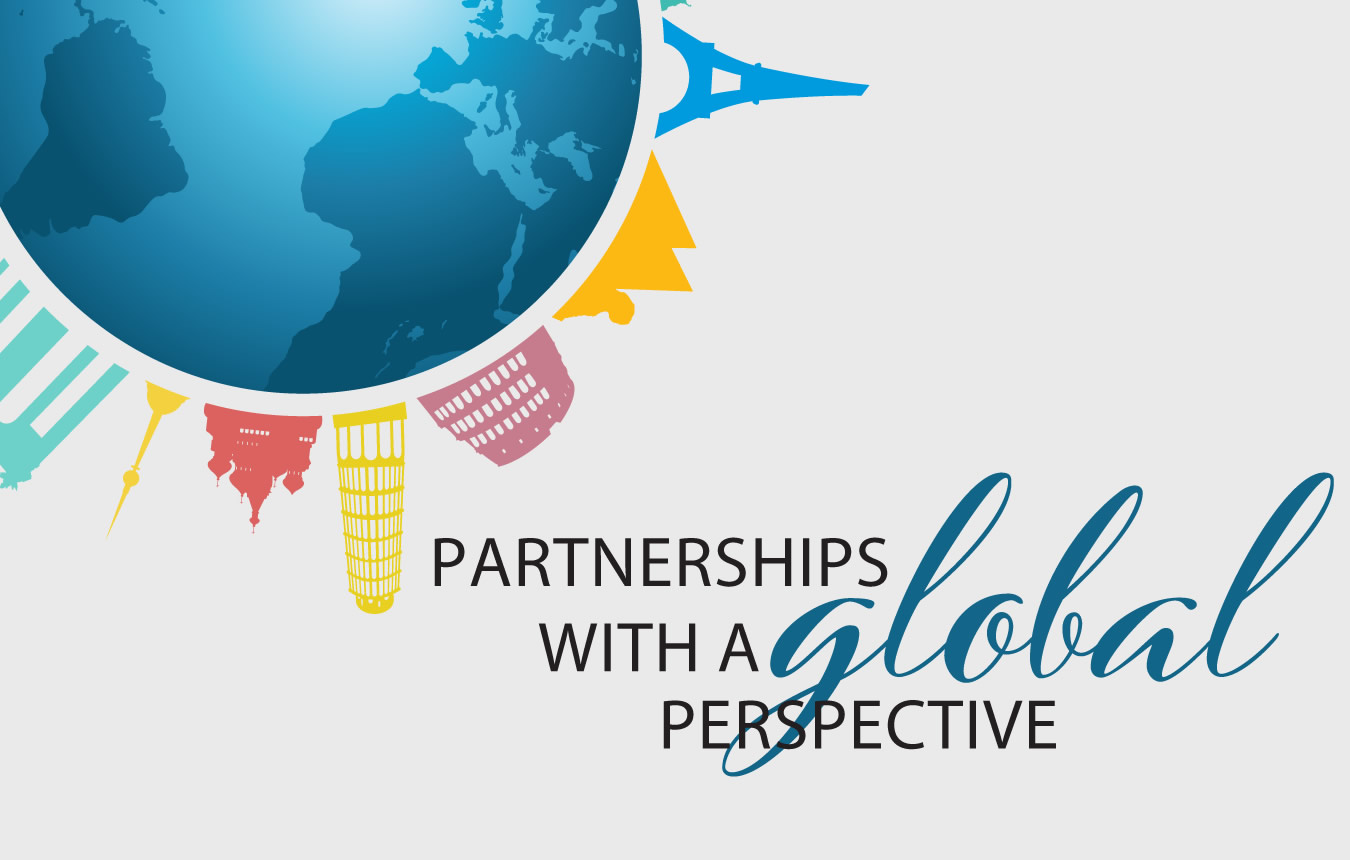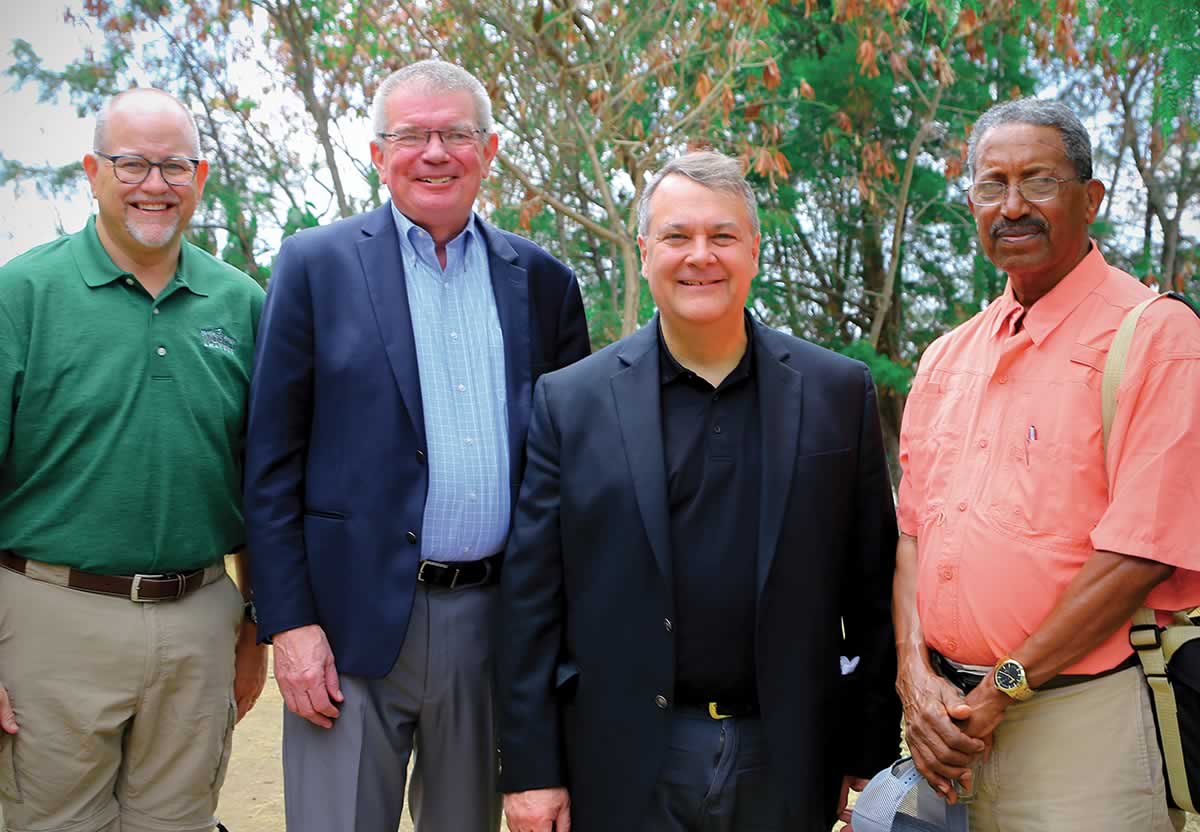
Concordia Seminary Newsroom

Concordia Seminary forms theological education bonds in the U.S. and around the world
by Travis Scholl
Exposed to dust and heat in the high elevation of southeast Ethiopia, the nearly open-air shops in Bishoftu have just about everything you might need.
Need a bed? A steel door or gate for your compound? Haircut? Tires for the cart your horse is pulling? It’s all here, on the streets of Bishoftu, a bustling city southeast of Addis Ababa, Ethiopia, where crowds of people swarm, sit and watch life go by. Goats munch on the sparse grass.
Concordia Seminary President Dr. Dale A. Meyer takes it all in through the car window. It’s early March, and Meyer has traveled nearly 8,000 miles from home. He’s in Ethiopia with President Dr. Lawrence R. Rast Jr., his counterpart at Concordia Theological Seminary, Fort Wayne, Ind., and Dr. Jeff Skopak and Andemichael Tesfazion, both of Grace Lutheran Church in Jacksonville, Fla.
Besides becoming acquainted with the Ethiopian Evangelical Church Mekane Yesus (EECMY) — rapidly approaching 10 million members — a main purpose of this visit is for the two seminary presidents to spend time with Dr. Bruk Ayele, president of the Mekane Yesus Seminary.

From left, Dr. Jeff Skopak, Dr. Dale A. Meyer, Dr. Lawrence R. Rast Jr. and Andemichael Tesfazion in Bishoftu, Ethiopia. Photo: Courtesy Dr. Dale A. Meyer
In one sense, the visit represented a continuation of what the Seminary has already been doing on the African continent.
In recent years, a number of our professors have taught at seminaries in South Africa, Kenya, Ghana, Togo and Ethiopia, including Professor Emeritus Dr. Victor Raj, who will make a trip to Kenya this fall. And Concordia Seminary has developed and delivered a program for continuing education of Lutheran Church—Missouri Synod (LCMS) missionaries in the eastern and southern African regions. Here in the United States, African immigrants, along with immigrants from other parts of the Global South, have been trained for ministry through the Seminary’s Ethnic Immigrant Institute of Theology (EIIT).
“As we ponder the future of our Seminary, partnering in theological education with those who desire our biblical and Lutheran theological education — both in the United States and around the world — will be key to our future vitality,” Meyer says.
Lutheran churches in African countries like Ethiopia, Madagascar and Tanzania have experienced the most rapid growth anywhere in global Lutheranism in the 21st century, growth like the early church experienced in the Acts of the Apostles.
Rather than “us” going to “them,” these churches are coming to Concordia Seminary, inviting us to partner with them to address needs that they themselves have identified.
While in Bishoftu, Rev. Jira Dusera Ganty, an EECMY pastor, took Meyer, Rast and Skopak to a congregation he planted. Today, it’s a large congregation with a day school. This congregation has planted 70 other congregations. Seventy! While visiting that congregation, Meyer recalls hearing the local mosque broadcasting its call to prayer. In this place, Ethiopian Lutherans are worshipping while minarets blare in the distance, calling Muslims to worship.
These are not “traditional” mission fields.
There are already more than three times as many Lutheran Christians in Africa as in North America. Rather than “us” going to “them,” these churches are coming to Concordia Seminary, inviting us to partner with them to address needs that they themselves have identified. In most cases, this involves theological education. The resources of an established institution such as Concordia Seminary — recognized both for high standards of scholarship and teaching and for faithful commitment to biblical theology — can help fast-growing African churches approach their ongoing mission and ministry with theological depth and advanced training. This reflects the 21st-century reality of global Christianity: multiplying networks of mutually beneficial partnerships and exchanges.
As a result, Lutheran churches in the United States will see the benefits of these partnerships and exchanges as they welcome the presence and perspectives that Christians from the Global South (not just Africa) will bring to their doorstep. African churches are already sending their best and brightest to places like Concordia Seminary to receive advanced theological training.
In April, the Lutheran Women’s Missionary League presented Concordia Seminary with a grant to help fund the education costs for Graduate School students from African countries. At the check presentation ceremony, Rev. Tibebu Teklu Senbetu, one of the Ph.D. students from Ethiopia currently on campus, stated, “Although the Lutheran church is growing fast in Ethiopia, our biggest challenge is to have well-educated deaconesses, pastors and professors. … There is a pressing need to have well-trained pastors and professors from the confessional Lutheran seminaries.”
The implication is that Senbetu will do exactly that: He will take his advanced theological training back with him to teach future generations of pastors and evangelists in Ethiopia.

Many children are among the 2,000 in attendance at a church service in Dukem, Ethiopia, in which Dr. Dale A. Meyer preaches. Courtesy: Dr. Dale A. Meyer
Or, as Meyer says in an essay he co-wrote with Rast: “A vision that God’s work is global and multiethnic in the United States is a key to energizing local ministry and mission.” (Read the full essay.) Part of that work will include not only encouraging students to enroll in our distance programs geared to ethnic immigrants, or international students into our graduate programs, but also reaching out to the second and third generations of immigrant Americans for candidates in the Seminary’s residential programs for pastoral and deaconess studies.
For Concordia Seminary, this is not a short-term, stopgap measure. We are in it for the long haul, and it is part of a generational effort.
“Working now to increase the number of ethnic pastors and deaconesses will help us reach communities that otherwise may not be blessed with our Christ-centered Gospel, that ‘everyone who calls on the name of the Lord will be saved’ (Romans 10:13 ESV),” Meyer says.
Not only is Concordia Seminary sending professors to seminaries in the Global South to teach, but theologians from the Global South are here, at the Seminary, teaching and enlarging the minds and hearts of future church workers of how God is at work in the world. All of it is part of the ongoing work of the Holy Spirit to call, gather, enlighten and sanctify the whole church on earth, in every place.